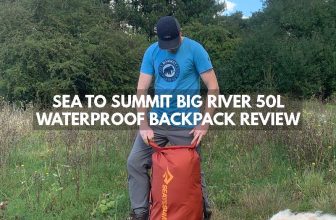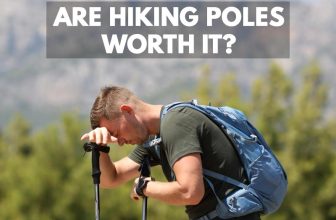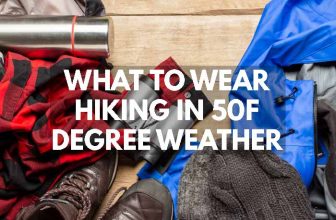Last Updated on 12/04/2022

Are Compression Pants Good For Hiking? This is a question we often get asked when we are out on the trail ironically wearing compression pants to hike in. In this article, you will learn how compression pants help reduce chafing and muscle fatigue as well as 10 benefits that outweigh the funny looks you might sometimes get.
Compression pants are used in lots of sports and for many different reasons but are they any good for hiking? To answer this we need to understand what we mean by good and really explore the benefits they might bring to us, hikers.
The main benefits compression pants have for hikers are reducing muscle stress and reducing friction. There are other benefits too which we get into shortly but for now let’s assume that good means effective at these two things: reducing muscle stress and friction. We should also state the importance of comfort too but that is important for all clothing so we will touch on that later too.
Are Compression Pants Good For Hiking?
Compression pants are good for hiking if you want to avoid chafing, compress your muscles, and wick moisture away from your legs. They are not so good if you prefer looser fitting clothes. If the tightness isn’t an issue for you though then compression pants are an excellent base layer that can help reduce muscle fatigue both during and after a hike.
Hiking in compression pants is not something most recreational hikers will even consider because chaffing and muscle fatigue usually only happens after racking up some serious mileage. So for long-distance hiking and endurance walks compression pants make the most sense and become part of the uniform. So while compression pants are good for walking, they are not always necessary.

10 Benefits of Compression Pants for Hiking
Here are the reasons we think compression pants are good for hiking:
1. Improve Blood and Oxygen Flow
A study published on ResearchGate showed that compression pants have been shown to increase blood flow and oxygenation in your muscles. What does this mean for hikers? In theory, this means that your leg muscles will have access to more oxygen and allow you to hike further and harder without tiring.
2. Reduce Muscle Fatigue
The sports experts at the University of Pittsburgh Medical Center (UPMC) published an article in 2016 that showed the benefits of compression gear. One of the major benefits is a reduction in muscle fatigue and the ability to prolong periods of peak performance before feeling tired.
Compressing the legs muscles improves oxygen and blood flow which reduces lactic acid build-up and boosts recovery times dramatically. This means that your legs don’t feel tired as fast and when they do, it takes less time to recover.
3. Relieve Muscle Aches
In the same way that compression pants help reduce muscle fatigue on a hike they also help to relieve the aches and pains, you feel after a long day of hiking. The constriction of your thigh and calf muscles improves circulation which means your muscle strength rebounds faster and you feel less achy after a hike. These benefits can also be appreciated the next day when you wake up and your legs feel fresh instead of sore.
4. Eliminate Chafing
For me, this was one of the biggest reasons I started wearing compression shorts and then later compression tights or pants. I am not overweight, nor do I have particularly big thighs, but I always used to get chafing between my legs which became sorer with every stride.
Compression pants create a smooth barrier between your legs to reduce friction and eliminate chafing for good. No more lubing up my thighs with vaseline or going commando, just pure confidence that I won’t have a rash at the end of the day.
5. Enhanced Endurance
The cumulative effect of wearing compression pants for hiking is that your endurance levels go up and you are more likely;y to enjoy your hike. Being able to hike further without feeling tired is taken for granted if you are fit and healthy but if you carry a little bit of extra weight like me then you should be taking advantage of easy wins like this. An article published by the National Library of Medicine also confirms this with evidence.
6. Protect Against Biting Insects, Ticks, and Irritation to Plants
Compression pants that reach your ankles provide ultimate protection against itchy long grass rubbing your legs as well as all other kinds of plants that can cause skin irritation. Leggings with compression will also prevent ticks and leeches from latching onto your skin if you are in boggy area or locations with lots of ticks.
When it comes to biting insects I cannot guarantee your compression tights will stop giant mosquitos, but I have never had issues with midges, sand flies, and small biting insects when wearing them.
7. Help Prevent Injuries
If you have ever suffered from a sprained or weak joint in your ankle, knee, or wrist then you will know that the best way to support it is with compression. You can use bandages, straps, and bands to provide support when recovering from an injury but why don’t we just boost the support in the first place?
Compression pants reduce muscle oscillations and vibration in skeletal muscles and add support all the way up your leg and up to your groin. This means that you are less likely to completely roll your knee or pull a muscle or your hamstring.
8. Sun Protection
If you are hiking in hot weather then lathering up in suncream isn’t the nicest feeling. I have lost count of the number of times I forgot to reapply sunscreen to parts of my leg to find 3rd-degree burns above my sock line or behind my knee at the end of the day. Compression pants are usually a minimum of UPF factor 50+ which means no more sunscreen and no more burnt legs. Couple this with a hooded sun shirt and you can be sure to stay UV safe.
9. Wick Moisture from Your Legs
If you are worried about compression pants being too hot then fear not. The stretchy material used in compression legwear is incredibly breathable and efficient at wicking moisture. Moisture is drawn away from your skin and will typically dry within 15 minutes in a slight breeze or warm weather. This keeps you cool when it’s hot and also prevents your sweat from chilling you when it’s cold.
10. Base Layer Insulation
Compression pants are not just for hiking in summer though and actually have an additional benefit in the winter of being able to wear them as base layer bottoms. They still provide all the other benefits underneath your shell pants but also help to keep you warm with a layer of insulation and moisture-wicking properties.

Downsides of Compression Pants for Hiking
Hiking in compression pants is not for everyone and here are the common reasons why some people disagree with them:
Can Be Too Tight
One of the main pushbacks we hear from people who have tried compression pants and didn’t like them is that they are too tight. I completely understand why someone may feel this way as this was my reaction when I first tried a pair on. I simply returned them and ordered the next size up and found this to be much more comfortable to hike in.
Places, where the compression felt too tight for me, were around the cuffs of the ankle and lower calf however I have since learned that they do stretch out a little as you break them in. Still, if you are not a fan of tight-fitting clothes then the compression can be an overbearing downside.
Thin Material
The thin and elasticated fabric used in compression pants is good for hiking in that you have a complete range of unrestricted movement but the downside is that it isn’t very durable. If you accidentally scuff your knee on a rock as you are scrambling up a mountain it is not uncommon to make a hole. That is why we always wear something over the top of our compression tights like a pair of shorts or trekking pants with reinforced knees.
Everything is On Show
This maybe is or isn’t such a problem for the ladies but as a guy, it feels kind of weird at first to pull on some compression tights. You look in the mirror and it doesn’t take much imagination to notice what’s inside. Even if you are proud of what you see, nobody else wants to see that junk and so you feel obligated to cover up with a pair of shorts or pants over the top.

Compression Pants Vs Compression Shorts for Hiking
While compression shorts are great for running and jogging, I prefer to wear full-length compression pants to hike in. This is for the reasons listed above as well as the fact that compression shorts often ride up your leg requiring constant readjustment. This is awkward if hiking in a group or having a heavy pack on which is uncomfortable to reach down with. Compression shorts are obviously more breathable but provide less protection overall.
Should You Wear Underwear with Compression Pants?
The decision to wear hiking underwear beneath your compression pants is personal. I have found that you don’t actually need underwear when wearing compression pants, so long as you wear some loose-fitting shorts over the top for modesty. That being said if you are on a multiday hike then it is less hygienic to not wear underwear unless you are washing your pants daily.
Can You Wear Shorts and Pants Over the Top of Compression Pants?
You absolutely can wear a pair of shorts or pants over the top of your tight-fitting compression pants and still experience all of the benefits with no extra downside. Personally, I like to wear a pair of loose hiking shorts over the top of mine which not only provides me with pockets but also doesn’t put anyone off their dinner.
How Tight Should Compression Pants Be for Hiking?
Compression pants are designed to be tighter than base layers and thermal clothing but never should they feel uncomfortably tight. The sensation should feel like if you were to put a light knee brace on but for both your entire legs. Your muscles will feel tighter and jiggle less and when your legs brush together as you hike there is no friction between your thighs.
If you feel that your compression pants are too tight and are actually cutting off your circulation as opposed to improving it th en you should probably get the next size up or try a different brand.
Are Compression Pants Good For Hiking? We hope that we answered this question for you but if not feel free to get in touch for advice.






